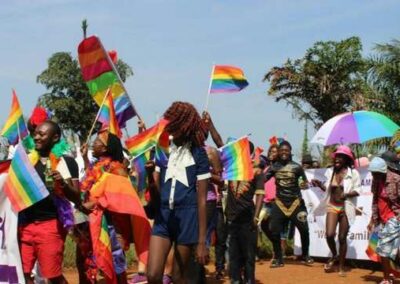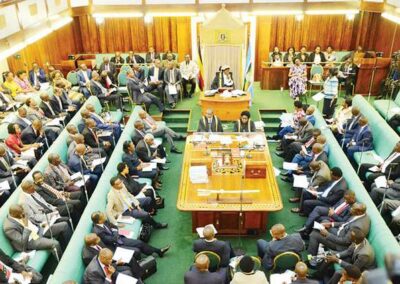African countries are known for making harsh anti-gay laws. In most places, homosexuals get sentenced to a few years if they are caught. However, on Tuesday, the Ugandan parliament approved some of the harshest anti-LGBTQ+ laws, proposing death sentences for some offences.
The country, which already had some of the harshest anti-gay laws, further cracked down on the group of people identifying as LGBTQ+. Under the new legislation, there is a death penalty for people that commits “aggravated homosexuality” – a term used to describe homosexual acts without consent, against children and people with mental or physical disabilities.
The amendment reads: “A person who commits the offence of aggravated homosexuality and is liable, on conviction to suffer death.”
Earlier this year, Asuman Basalirwa, an opposition lawmaker, introduced the Anti-Homosexuality Bill. He said it was introduced to “protect our church culture; the legal, religious and traditional family values of Ugandans from the acts that are likely to promote sexual promiscuity in this country.”
During Tuesday’s debate on the bill, Basalirwa repeated the claim that the anti-homosexuality bill was meant to protect the people, especially the children of Uganda.
“The objective of the bill was to establish a comprehensive and enhanced legislation to protect traditional family values, our diverse culture, our faiths, by prohibiting any form of sexual relations between persons of the same sex and the promotion or recognition of sexual relations between persons of the same sex,” Basalirwa said during the debate.
What the bill contained
Although the bill’s content is yet to be published, some of the following issues were discussed and debated in parliament.
- If a person is found grooming or trafficking children to engage them in homosexual acts, they would be sentenced to life imprisonment.
- Any organisation, individual, or institution could face legal action if it supports or provides funds for the activities of LGBT organisations or rights groups. Individuals or organisations are also prohibited from distributing pro-gay media materials and pieces of literature.
- Journalists, media groups, and publishers will also face prosecution if they distribute contents that advocate for gay rights or “promote homosexuality.”
- Hotel and brothel owners could be jailed if their premises are used for homosexual acts.
At the end of the debate and vote, the parliament speaker said, “the ayes have it,” which could only mean one thing. The controversy would become law if president Yoweri Museveni gave his accent.
Will the president sign the bill?
President Yoweri Museveni is known for his extreme views on homosexuals. In 2014, he signed into law the Anti-Homosexuality Act, which criminalised homosexuality with punishments ranging from life imprisonment to a fine.
Museveni has publicly stated that homosexuality is “unnatural” and a “Western import” that threatens traditional African values. He has also expressed concern that homosexuality could lead to the spread of HIV/AIDS in Uganda. Overall, Museveni’s views on homosexuality have been controversial and have drawn criticism from human rights organisations and other countries that support LGBT rights. With these, one could easily conclude that the 78-year-old would approve the controversial bill. But that might not be the case.
In 2019, Museveni softened his stance on homosexuality and said, “outsiders should not come to our country and impose their views on us.” He also indicated that he would not support any further criminalization of homosexuality in Uganda.
If the Ugandan president could keep to the promise he made in 2019, he is unlikely to approve the bill. Also, some members of his National Resistance Movement in parliament opposed the bill during the debate, saying there was already enough punishment for homosexuals in the country.
Do not sign the bill, UN and Amnesty International tells Museveni
Following the approval of the controversial bill by the Ugandan parliament, the UN High Commissioner for Human Rights, Volker Turk, had called on President Museveni not to enact the law, saying it is a troubling development.
“If signed into law by the president, (it) will make lesbians, gays and bisexuals criminals in Uganda simply by existing. It could give carte blanche to the systematic violation of almost all their human rights,” Mr Turk stated.
In the same tone, Amnesty International also called on Museveni to use his powers to veto the “appalling legislation,” describing it as “a grave assault on LGBTI people and is contemptuous of the Ugandan constitution.”
“Instead of criminalizing LGBTI people, Uganda should protect them by enacting laws and policies that align with the principles of equality and non-discrimination enshrined not only in Uganda’s Constitution but also the African Charter on Human and Peoples’ Rights,” the statement added.
Like the UN and other international organisations, human rights activists and gay rights groups in Uganda have asked several questions regarding the legislation. Human Rights Watch, in a statement on Wednesday, said it was time for the Ugandan government to stop the persecution of LGBT people and immediately pass a law that would, rather, protect everyone.
“Museveni should reject the bill and parliament should introduce comprehensive nondiscrimination legislation that would protect sexual and other minorities in line with Uganda’s international obligations,” the statement reads.
Many gay rights activists within Uganda have found ways to speak up about the situation. Clare Byarugaba, one of such activists, told BBC that the bill was meant to distract the public from the various failures of the Ugandan government.
She said: “They are trying to drum up anti-gay rhetoric to divert attention from really what is important to Ugandans in general. There is no reason why you should have a bill that criminalises individuals that are having consensual same-sex adult relationships,” Clare Byarugaba, a gay rights activist, told the BBC.
She argued that the law was baseless and that the government should rather introduce laws or “at least implement existing laws that protect all children … from defilement.”
The unresolved issue of homosexuality in Africa
The general view of homosexuality in Africa is complex and varies depending on the country and cultural context. In many African societies, traditional cultural and religious beliefs view homosexuality as immoral and a deviation from societal norms. Same-sex relationships are often stigmatised, and individuals who identify as LGBTQ+ may face discrimination, harassment, and violence.
Some African countries have laws that criminalise homosexuality, with punishments ranging from fines to imprisonment. For example, in Nigeria and Tanzania, same-sex acts are punishable by up to 14 years and 30 years in prison, respectively.
However, there are also pockets of acceptance and tolerance towards homosexuality in some African countries. In South Africa, for example, same-sex marriage is legal, and the country has strong legal protections for LGBTQ+ individuals. In other countries, such as Kenya, active LGBTQ+ advocacy groups are fighting for equality and recognition.
The attitudes towards homosexuality in Africa are diverse and evolving, with some countries and communities becoming more accepting while others remain deeply conservative and resistant to change. However, in most places, homosexuality is seen as an importation from the west and no amount of pressure would convince the people otherwise.















0 Comments